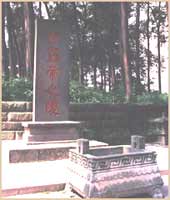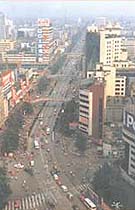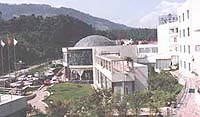History Chengdu
Chengdu is one of the 24 well-known historical cities approved by the Sichuan provincial committee and the State Council of China. 2,300 years ago, King Kaiming the 1Xth of the Shu State relocated his capital here. In 256BC, the Shu County Governor Li Bing and his son built the Dujiang Dam. Since then the Chengdu plain has never had any flood or drought disasters and its farm and handicraft industries have prospered. The Chengdu plain has hence been referred to as the "Kingdom of Heaven." Since then, Chengdu has become the state capital of Sichuan, and an important political, economic, |
|
cultural and military center in the southwest. It was one of the 5 famous cities in Han Dynasty, and the best commercial city second to Yangzhou only in Tang Dynasty. It was also the second largest cosmopolitan city of the North Song Dynasty (960-1127) next to its capital city Bianjing, where Jiaozi, the earliest paper money in the world, was first circulated.
Geography Chengdu
Chengdu is located in the middle of Sichuan Province in the west part of the Sichuan basin, between 102°54´ and 104°53´ east latitude and between 30°05´ and 31°26´ north longitude. It is the center of science and technology, trade and commerce and finance and the hub of transportation and telecommunications in the southwest. It is adjacent to Deyang city in the northeast, Neijiang city in the southeast, Leshan city in the south, Ya'an prefecture in the southwest, and Aba Tibetan autonomous prefecture in the northwest. The average height of the Chengdu plain is 500 meters, with the highest point reaching 5,364 meters above sea level and the lowest point 387 meters. Its geographical features mainly involve plains, plus hills and mountains, with the terrain slanting from northwest to southeast. In the northwest is the Qionglai Mountain, and in the northeast is the Longquan Mountain. The city covers a total area of 12,390 square km including 87 square km of urban area, with a total length of 192km from east to west and 166km from north to south.
Climate Chengdu
Chengdu enjoys a humid, subtropical monsoon climate. Firstly, the climate differs in the eastern and western parts, and the east is warm and the west is cool. Secondly, it is warm in winter, and spring comes early, with the frost-free period exceeding 337 days each year. The average annual temperature is around 16.5 degrees centigrade, which is 2-3 degrees centigrade higher than in the middle and lower reaches of the Yangtze River, and spring comes one month earlier, each year, there are only a few days when the temperature drops to below zero degrees centigrade. Thirdly, it enjoys plenty of rainfall in summer and autumn although it rains little in winter and spring, with an average annual rainfall of 1124.6mm. The rain fall of a record high year could be 2 times of that of a record low year. Fourthly, it provides enough sunlight, warmth and rainfall in the same seasons, which is beneficial for the growth of plants. Fifthly, the wind speed is low, the average annual wind speed is 1-1.5 meters per second, and the annual sunshine averages 1,042-1,412 hours, covering 83.0-94.0km per square centimeter.
Natural Ecological Environment Chengdu
The rate of vegetation coverage in Chengdu reaches 30.1 percent, and garbage treatment 100 percent, noise in tourist attractions averages below 60bd, and noise in urban area 54.9bd. The air pollution index indicates 78, and average drinking water quality in the city amounts to 99.1 percent. In 1997, in the comprehensive environment examination of 46 major Chinese cities, Chengdu won the fourth place in comprehensive score, the second place in environmental quality, and ranked the first among inland citi
Economy Chengdu
|
In 1992, Chengdu ranked the 12th among the top 50 cities in terms of comprehensive strength in China, and its infrastructure for investment was among the top 40 cities. During the eighth Five-Year-Plan, Chengdu's average gross output value saw a year-on-year increase of 16 percent. In 1997, its gross output value stood at 101 billion yuan, rising 11.5 percent over the previous year, with the growth rate higher than the average level in the country and other provinces, with an average per capita production value of 10,254 yuan per year. In 1998, its GDP reached 110.3 billion yuan, with the GDP proportion of the first, second and tertiary industries occupying 11.2, 45.1 and 43.7 percent respectively. |
The growth speed of electronic and information, machinery (including automobile), medicine, and food industries quickened, the "Chengdu-made" products increased, economic returns rose. The total demand grew significantly, and a balance between demand and supply was maintained. In 1998, fixed assets investment recorded 37.21 billion yuan, increasing 20 percent over the previous year. Its financial income grew steadily, and financial operation has been satisfactory.
Culture Chengdu
Early in the Han Dynasty (206BC-220), China's first official-run school, Wenweng Shi House was established in Chengdu. It was also home to men of letters and well-known people from various dynasties, including the founder of Han prose Sima Xiangru, poet and prose writer, philosopher and linguist Yang Xiong, knowledgeable lady Zhuo Wenjun of the Han Dynasty; woman poet Xue Tao of Tang Dynasty (618-907); master painter Huang Quan of the Five Dynasties (907-960); historian Fan Zuyu of the Song Dynasty (960-1279); and scholar Yang Shen of the Ming Dynasty (1368-1644). Well-known poets Li Bai, Du Fu and Lu You had once settled in Chengdu. It is also the birthplace of the Chinese block printing technique, and Sichuan silk. During the Tang and Song dynasties, Chengdu was famous for its music, songs and dancing and operas. Since the Qing Dynasty (1644-1911), Chengdu's tea culture became known throughout the country and grew popular. Now, Chengdu has more teahouses than and other place in the world. In 1993 and 1997, International Panda Festival was held here.
In 1997, the fifth Chinese Art Festival and the folk art fair of international friendship cities were held here. The city now has 16 art performance troupes, 16 public libraries, 4 public art galleries, 14 cultural centers and 8 museums.
A Survey of Tourist Industry Chengdu
Tourism began in Chengdu in the early 1980s. During the period of the eighth Five-Year-Plan, the city committee and municipal government have listed tourism as one of the development strategies of the city. In 1998, they promulgated the "decision on accelerating the development of tourism," and devised the "plan of developing tourism in Chengdu", which put tourism as a pillar industry of governmental support. Up to now, |
|
the development of tourism has been coordinated, integrating food, accommodation, sightseeing, shopping and entertainment, and service functions are comprehensive and facilities complete.
The city now has 57 tourist hotels, of which 53 are star rated hotels with a total of 20,000 beds, 5 designated restaurants; 142 travel agencies including 23 international ones; 11 tourist bus companies and designated bus companies, 108 taxi companies, 3 tourist airlines which offer charter services, 3 special tourist trains and one tourist shipping company. There are five shopping streets, 12 designated commercial centers for tourist shopping, 18 designated tourist restaurants, more than 10 tourist recreational centers, 14 tourist safety and relief centers and 8 tourist consultation and supervision institutions.
During the seventh and eighth Five-year-plan period (1980-1990), Chengdu received a total of 1.28 million overseas tourists, earning $259 million and 103 million domestic tourists, with an income of 4.669 billion yuan. In the first three years of the ninth Five-year-plan, it received 491,100 overseas tourists, creating $185 million in profits and 60.5 million domestic tourists, earning 17.854 billion yuan. Before the eighth Five-year-plan, tourism accounted for no more than 3 percent of the city's GDP but it rose to 6 percent in 1996, 6.5 percent in 1997 and 6.88 percent in 1998. Tourism has become a new economic growth point of the city. In 1998, Chengdu and Dujiang Dam city under its jurisdiction have been listed among the first group of "Top Tourist Cities of China."
City Flower Chengdu
On May 26, 1983, the ninth NPC standing committee of Chengdu decided to choose the hibiscus as the city flower.
The hibiscus has a long history in Chengdu. According to historical records, during the Five Dynasties, Emperor Meng Chang of the Shu State had hibiscus planted along the city walls of Chengdu, When autumn arrives, hibiscus blossom stretches for 40 miles, and therefore, Chengdu is also known as the "Hibiscus City." The hibiscuses are large, brightly colored, elegant and have several well-known varieties. An example is the "drunken hibiscus" which changes color three times a day, it turns white in the early morning, light red at noon and bright red in the evening. In poems, hibiscuses are praised as equal to chrysanthemums, or the best of autumn flowers.
City Tree Chengdu
On May 26,1983, the standing committee of the ninth NPC of Chengdu decided to choose the ginkgo as its city tree.
The ginkgo tree is a precious ancient tree of Chengdu. According to a survey, the city now has over 600 ginkgo trees, the largest one is inside the courtyard of the Chengdu Real Estate Co. located on Tidu Street. It is 157 centimeters in diameter, with a history of over 500 years. There are also some ancient ginkgo trees in the forest gardens in the suburbs. On the Qingcheng Mountain of the Dujiang Dam City, there stands a large ginkgo tree, which could only be encircled by five people hand in hand. It is said to be planted by Master Zhang of a Taoist sect, and has a history of over 2,000 years. Ginkgo trees grow strong, with thick trunks and beautifully-shaped cap; its leaves are in the shape of butterfly, and turn yellow in the autumn. Its fruits are also a good tonic. |








